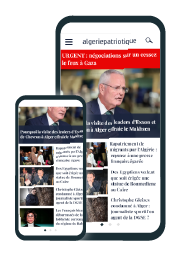Author: Mohamed El-Ghazi
Algeriepatriotique : Terrorist attacks hit the French capital on the 13th November, killing 130 and wounding more than 400 people. What's your reading of this unprecedented attack on French soil ?
Author: Mohamed El-Ghazi
Algeriepatriotique : Terrorist attacks hit the French capital on the 13th November, killing 130 and wounding more than 400 people. What's your reading of this unprecedented attack on French soil ?
Norman Solomon : This attack was perpetrated by people with misdirected rage whose actions were murderous and criminal. They perpetrated terrible inhuman atrocities. Unfortunately, many people cite atrocities by some people as excuses for inflicting their own atrocities. We cannot accept this – whether the actions are by the so-called Islamic State or any government or other entity.
Why now ?
Deadly violence has escalated in many countries in recent years. These cycles of violence become their own rationales for more. There are of course many factors, none of which excuse further deadly violence. Making war to end war has proven to be a dismal failure. It does no good to kill enemies while creating more enemies.
Is the war in Syria the only reason?
The war in Syria, while horrific, is part of a broader pattern. There have always been forces — governmental and non-state actors – that have used terrible violence as a means of advancing political and social agendas. In the region, this process escalated enormously with the U.S. invasion of Iraq in 2003. It was criminal, barbaric and contrary to international law. The invasion has caused many cascading effects of other criminal and barbaric actions in the region and beyond. Grief, bitterness and rage have given rise to more grief, bitterness and rage. This is no way of affirming life or creating a better future.
In your latest book "War made easy", you analyze the wars launched and waged by the US. What is the main thrust of your book?
Propaganda for war is all too easy for people in power to impose and exploit. War brings enormous suffering, but for those in power it can bring at least the illusion of greater power. And war is quite profitable for corporate sectors; after all, nearly half the weapons in the entire world are sold by the United States. As people of goodwill – whatever our nationality, ethnicity or religion – we can and must recognize that calls for war are pernicious and destructive. It's imperative that we see through the propaganda from news media (including social media) that encourages us to accept or even participate in war. The sirens of war can be seductive in the worst ways. They should be resisted and overcome with civic solidarity and commitment to creating a better future for the next generations.
Why do Western European countries align themselves systematically with Washington's penchant for war? What are the reasons which lead them to tow the line?
The governments of Western Europe have allowed themselves to function as accomplices to the war crimes of the United States. The pressures are economic, geopolitical and diplomatic. Along the way, NATO – in Kosovo in 1999 and in Afghanistan since 2001 – has shifted from being merely a defensive alliance into being an aggressive alliance, escalating war instead of deterring it.
Why did Western capitals oppose Russian military intervention against the so-called "Islamic State"?
Unfortunately, the horrendous war in Syria has become in part a proxy war between several large powers inside and outside the region. In Washington in particular, geopolitical leverage against Russia has been uppermost in the minds of many policy makers.
And why did the same capitals make a U-turn since the attacks on Paris? In other words, why are they now prepared to work with Moscow?
We shall see the extent of the cooperation. The perception of a common enemy in ISIS may continue to shorten the distance of viewpoints in terms of the outlooks in Washington and Moscow, for instance — but to what extent remains unclear.
In your book, you mention those «who pull the strings» on the global stage. Who are they really?
There are many "string pullers." In that sense, we live in a multi-polar — or one might say "multi-string-puller" – world. Yet clearly it is those governments with the biggest military forces and the greatest economic leverage that pull the most big strings. We really must realize that the greatest threats to humanity worldwide include what Martin Luther King Jr. called "the madness of militarism" – along with the scourge of poverty and the shortage of authentic democracy. We must also push back against the injustices of racism, oppression of women, bigotry against gay people and other cruel prejudices that diminish humanity to such a huge extent. And there is the necessity of recognizing and taking drastic steps against human-caused climate change.
The main media outlets alter the truth and disseminate lies on Iraq, Libya, Syria and Ukraine. What's the borderline between ethical and objective news reporting and media propaganda?
We should always strive to recognize that media outlets have built-in biases. The proper side of the borderline between decent journalism and media propaganda involves independence, factual honesty, fairness and willingness to state difficult truths.


